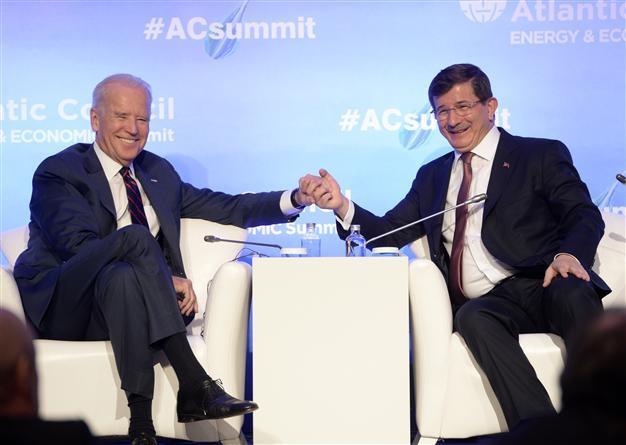Biden, in Turkey, calls concentration of powers 'corrosive'
ISTANBUL - Agence France-Presse

US Vice President Joe Biden (L) shares a joke with Turkish Prime Minister Ahmet Davutoğlu during an Atlantic Council meeting in Istanbul . AA photo
U.S. Vice President Joe Biden on Nov. 22 warned that a concentration of powers under a head of state was "corrosive," ahead of a meeting with Turkish President Recep Tayyip Erdoğan for the first time since his critical remarks over Turkey’s policies in Syria sparked a crisis in early October.Biden’s remarks accusing Turkey of facilitating the development of the Islamic State of Iraq and the Levant (ISIL) and other groups fighting the Bashar al-Assad regime in Syria had angered Erdoğan.
Speaking at a meeting of the Checks and Balances Network, an initiative that gather more than 150 nongovernmental organizations. Biden noted that in the United States the three branches of power - presidency, legislature and judiciary - are equal in status.
"Our founders [of the United States] concluded that a concentration of powers was the most corrosive thing that can happen to any system. We still believe that," he said.
Biden did not specifically refer to Turkey in his remarks open to the press ahead of a closed-door meeting, saying he was not in Istanbul to "proselytize."
But he added: "The best way to preserve freedom is not to have too much power concentrated in any branch of government."
He said his own insistence on the issue was so great that President Barack Obama "joked with me that I thought Congress should have more power than he does."
Energy warning to EU
Meanwhile, earlier in the day, Biden told Europe that it was time to act on improving its energy security, warning of Russia's "track record" in using energy supplies as a weapon.
Speaking at an Atlantic Council meeting in Istanbul, Biden said Europe needed to step up efforts to "ensure diversification" away from Russian oil and gas imports.
He said the crisis in Ukraine had again showed up "Russia's track record in using energy supplies as a form of a political weapon against neighbors."
"It's a huge strategic problem," he told the conference.
Biden said Russia "will and should remain" a major supplier of energy to Europe, but added that it "must play by the rules of the game. It cannot play with the game."
He applauded steps by EU states like Lithuania and Slovakia in diversifying their supplies but said "we cannot rest on our laurels, we have to finish the job ... Now is the time to act."
Europe experienced one of its worst ever energy crises in 2009 when Russia switched off supplies to Europe through Ukraine in the middle of a freezing cold winter.
















